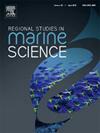Forecasting the impact of marine heat waves on farmed bivalves Nodipecten nodosus and Magallana gigas
IF 2.1
4区 环境科学与生态学
Q3 ECOLOGY
引用次数: 0
Abstract
Marine heat waves are considered a threat to the cultivation of commercially important species because exposure to thermal stress may lead to mass mortalities of organisms. Investigating the upper thermal limits of marine species and their capacity for shifting these limits can contribute to securing the sustainability of aquaculture activities as exposure to heat extremes is increasing in frequency. The scallop Nodipecten nodosus and oyster Magallana [Crassostrea] gigas are two bivalve species commercially farmed in Brazil and production of spat is undertaken mainly at two hatcheries located in different regions subjected to distinct climate and seawater temperature conditions over the year. This study investigated the upper thermal tolerance of populations of N. nodosus and M. gigas sourced from temperate and tropical farming areas. Groups of N. nodosus and M. gigas farmed under warmer temperature regimes exhibited lower mortality rates when exposed to elevated temperatures compared to groups sourced from cooler waters and consequently displayed higher values of lethal temperature 50 (LT50). N. nodosus exhibited superior thermal tolerance than was previously known, however, commercial cultivation of this species is still at risk of mass mortalities depending on the duration and intensity of forecasted heat waves in both cultivation regions. M. gigas showed a high capacity to endure acute thermal stress at the resting stage of the reproductive cycle. To enhance the aquaculture sector's resilience to climate change, we recommend the development of cultivation methods that account for marine and atmospheric heat wave events, alongside continuous monitoring of abiotic factors at farming sites.
预测海洋热浪对养殖双壳贝类 Nodipecten nodosus 和 Magallana gigas 的影响
海洋热浪被认为是对重要商业物种养殖的一种威胁,因为暴露于热应力下可能导致生物大量死亡。调查海洋物种的热上限及其改变这些极限的能力,有助于确保水产养殖活动的可持续性,因为暴露于极端热量的频率越来越高。扇贝(Nodipecten nodosus)和牡蛎(Magallana [Crassostrea] gigas)是巴西商业化养殖的两种双壳贝类,它们主要在位于不同地区的两家孵化场进行鱼苗生产,这些孵化场常年受到不同气候和海水温度条件的影响。本研究调查了来自温带和热带养殖区的点头贝和千头贝种群的上层热耐受性。与来自较冷水域的群体相比,在较高温度条件下养殖的裸鲤和千层鱼群体在暴露于较高温度时死亡率较低,因此显示出较高的致死温度 50(LT50)值。鳕鱼的耐热性比以前已知的更强,但是,根据这两个养殖区域预报的热浪持续时间和强度,该物种的商业养殖仍面临大量死亡的风险。在繁殖周期的静止阶段,千层塔鱼表现出较强的急性热应激耐受能力。为了提高水产养殖业对气候变化的适应能力,我们建议开发考虑到海洋和大气热浪事件的养殖方法,同时对养殖地点的非生物因素进行持续监测。
本文章由计算机程序翻译,如有差异,请以英文原文为准。
求助全文
约1分钟内获得全文
求助全文
来源期刊

Regional Studies in Marine Science
Agricultural and Biological Sciences-Ecology, Evolution, Behavior and Systematics
CiteScore
3.90
自引率
4.80%
发文量
336
审稿时长
69 days
期刊介绍:
REGIONAL STUDIES IN MARINE SCIENCE will publish scientifically sound papers on regional aspects of maritime and marine resources in estuaries, coastal zones, continental shelf, the seas and oceans.
 求助内容:
求助内容: 应助结果提醒方式:
应助结果提醒方式:


